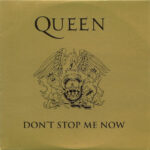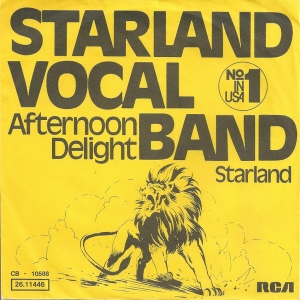 When “Don’t Stop Me Now” bursts from the speakers, it doesn’t feel like you’re listening to a song—it feels like you’ve been launched into orbit. Freddie Mercury doesn’t just sing; he accelerates, his voice a supersonic vessel fueled by pure joy and flamboyant energy. Released in 1979 as part of Queen’s Jazz album, “Don’t Stop Me Now” is one of those rare tracks that seems to transcend time, genre, and even gravity. It’s a high-octane anthem of freedom, hedonism, and unfiltered life force—a celebration of living in the moment with no brakes attached.
When “Don’t Stop Me Now” bursts from the speakers, it doesn’t feel like you’re listening to a song—it feels like you’ve been launched into orbit. Freddie Mercury doesn’t just sing; he accelerates, his voice a supersonic vessel fueled by pure joy and flamboyant energy. Released in 1979 as part of Queen’s Jazz album, “Don’t Stop Me Now” is one of those rare tracks that seems to transcend time, genre, and even gravity. It’s a high-octane anthem of freedom, hedonism, and unfiltered life force—a celebration of living in the moment with no brakes attached.
Over the decades, the song has gone from being a modest chart success to one of Queen’s most beloved classics. It’s appeared in movies, commercials, and TV shows, been covered by countless artists, and found its way onto “feel-good” playlists across generations. But beyond its surface-level exuberance lies a fascinating duality: it’s both an ode to personal liberation and, in retrospect, a bittersweet reflection of Freddie Mercury’s unstoppable—and ultimately tragic—momentum.
The Spark of Pure Exhilaration
“Don’t Stop Me Now” starts with a shimmering piano line, bright and crisp, like the ignition of a starship engine. Then comes Mercury’s voice—confident, playful, and irresistible. “Tonight, I’m gonna have myself a real good time / I feel alive…” From the first phrase, it’s impossible not to feel the infectious rush. The rhythm gradually builds, the band syncing together like a machine powered by ecstasy and adrenaline.
Brian May’s guitar licks cut through the mix with clean precision, while Roger Taylor’s drums maintain a steady propulsion beneath it all. John Deacon’s bass quietly anchors the chaos, allowing Mercury’s piano and vocals to soar. By the time the chorus explodes—“Don’t stop me now, I’m having such a good time, I’m having a ball”—the listener is completely swept up. It’s not just a song; it’s a full-body experience of acceleration.
What makes the track so unique among Queen’s catalog is how unapologetically euphoric it is. There’s no irony, no restraint, no melancholy. It’s Mercury in full command of his artistic and emotional power, creating something that radiates positivity without apology.
Mercury the Meteor
At its heart, “Don’t Stop Me Now” is pure Freddie Mercury. He wrote the song at a time when Queen was at its creative peak, but he was also asserting his individuality more than ever. After years of relentless touring, Mercury had moved into a more hedonistic lifestyle, exploring freedom, sexuality, and fame with an intensity that both energized and alarmed those around him.
You can hear that personal liberation all over “Don’t Stop Me Now.” The lyrics are a celebration of motion and invincibility—“I’m a shooting star leaping through the sky like a tiger defying the laws of gravity”—and each metaphor feels more extravagant than the last. Mercury doesn’t want to just have fun; he wants to obliterate the boundaries of normal existence. He’s flying, burning, traveling at the speed of light, and daring the universe to keep up.
The result is one of the most uncontainable expressions of joy in pop music. But what’s fascinating is how the rest of the band initially reacted. Brian May has said that while he loves performing the song now, at the time he was uneasy about it. To him, it seemed to symbolize Mercury’s increasingly reckless lifestyle. The exhilaration that powers the track was real—but so was the danger that came with it. Listening today, that tension gives “Don’t Stop Me Now” an emotional complexity hidden beneath its glittering surface.
Building the Perfect Rush
Musically, the song is a masterclass in controlled chaos. It’s built around a simple chord progression, but Queen’s arrangement transforms it into something extraordinary. Mercury’s piano drives the rhythm, delivering both percussive energy and melodic richness. The tempo sits just shy of breakneck speed, fast enough to make your pulse race but never so frantic that it loses control.
As the verses progress, the production layers deepen—lush backing vocals, multi-tracked harmonies, and May’s guitar weaving through the spaces between Mercury’s lines. When the bridge hits (“I’m a rocket ship on my way to Mars…”), everything takes off again, the song hitting another level of propulsion that feels almost dangerous.
That’s one of the most brilliant aspects of “Don’t Stop Me Now”: it feels like a thrill ride that’s barely clinging to safety rails. It captures that moment of being so alive that it’s almost too much, like laughter teetering on the edge of madness. Few bands have ever managed to translate that emotional voltage into sound the way Queen did.
A Song Reborn
When “Don’t Stop Me Now” was released as a single in 1979, it wasn’t a massive hit in every market. In the UK, it reached number 9—a respectable showing—but in the U.S., it barely cracked the Top 100. Yet, over time, the song became one of Queen’s most enduring and rediscovered gems.
Part of its resurgence came from the song’s irresistible adaptability. It found a second life in pop culture, most notably in the 2004 film Shaun of the Dead, where it scored a hilariously choreographed zombie bar fight. The scene turned the song into a new-generation anthem, a perfect blend of humor and heroism. After that, “Don’t Stop Me Now” was everywhere—from car commercials to Glee, from sporting events to karaoke nights.
It’s a song that refuses to age. That’s because its core message—joy as rebellion, movement as survival—resonates with every listener, no matter the decade. When Mercury belts, “If you wanna have a good time, just give me a call,” it feels like an invitation to join his cosmic joyride.
Mercury’s Defiance and Legacy
“Don’t Stop Me Now” also stands as a monument to Mercury’s fearless individuality. At a time when rock was dominated by masculine swagger and often rigid identity norms, he turned himself into an icon of flamboyant freedom. His theatricality wasn’t a gimmick—it was liberation as performance art.
This song captures that energy perfectly. It’s camp, it’s sincere, it’s extravagant, and it’s unashamedly queer in its celebration of pleasure and autonomy. It’s also deeply empowering, a sonic reminder that confidence isn’t just about control—it’s about the courage to lose it in the right way.
Tragically, the song’s exuberance carries a bittersweet aftertaste. Within a few years, Mercury would face the devastating onset of AIDS, a cruel contrast to the indestructibility he embodied here. That knowledge gives “Don’t Stop Me Now” an almost defiant poignancy. Listening today, you hear not just a man celebrating his vitality but someone daring the universe to extinguish his flame.
And of course, it never did.
The Alchemy of Joy
Queen’s music has always walked the line between rock and theater, between technical brilliance and emotional excess. “Don’t Stop Me Now” might be the purest expression of that balance. It’s as mathematically perfect as it is emotionally chaotic—a reminder that joy, when done right, can be just as profound as sorrow.
The production still feels timeless. The analog warmth of Mercury’s piano, the tight harmonies, and the slightly raw mix all add to its organic sense of motion. Even the fade-out feels intentional, as though the song refuses to end—it’s just moving too fast to stick around.
Part of the song’s continued appeal is that it can mean something different to everyone. To some, it’s a party anthem, the ultimate soundtrack for a night out. To others, it’s an inspirational mantra, a reminder to push through fear and hesitation. And for Queen fans, it’s a portrait of Mercury at his most fearless—a man chasing the horizon with laughter on his lips.
The Cultural Impact
There are songs that define eras, and then there are songs that defy them. “Don’t Stop Me Now” belongs to the latter category. It’s been embraced across generations, genres, and moods. Whether played in an arena or blasted in your car on a late-night drive, it hits the same way—a burst of light cutting through monotony.
The song’s cultural ubiquity speaks volumes about its emotional universality. It’s the anthem of every underdog, every dreamer, every moment where momentum itself feels like salvation. The track’s appearance in movies like Shaun of the Dead or shows like Doctor Who only amplified its reputation as a symbol of unstoppable spirit.
And yet, even after decades of overexposure, it never loses its freshness. That’s the magic of “Don’t Stop Me Now”—it’s immune to cynicism. Every play feels like a reset button on despair.
The Eternal Party
As the song races toward its finale, Mercury’s voice soars to operatic heights, his energy undimmed. “Don’t stop me now!” he repeats, almost as a dare. The harmonies swell, May’s guitar flares, and then—suddenly—it’s gone. The silence that follows feels almost shocking, like being thrown off a rollercoaster mid-ride.
That’s the secret to the song’s genius: it doesn’t just make you want to keep going—it makes you believe you can. It’s not just about having a good time; it’s about surviving through joy, about refusing to slow down even when the world wants to stop you.
Final Thoughts
“Don’t Stop Me Now” remains one of Queen’s most electrifying and enduring triumphs. It’s a song that captures everything Freddie Mercury stood for—passion, freedom, artistry, and a refusal to compromise. Over 45 years later, it’s still as vibrant and contagious as ever, a sparkling monument to unstoppable spirit.
Every note, every lyric, every triumphant chord carries the same message: keep moving, keep shining, keep living with fire in your heart. Whether you’re dancing, driving, or dreaming, “Don’t Stop Me Now” reminds you that life’s best moments happen when you stop worrying and start soaring.
It’s not just a song—it’s an eternal burst of light, hurtling across time and space, with Freddie Mercury at the controls, laughing into the void, daring the universe to keep up.



